President Donald Trump has publicly stated, “I know nothing about Project 2025,” and “I have nothing to do with Project 2025. . . . I haven’t read it. I don’t want to read it purposely. I’m not going to read it.” Trump has also averred, “I have no idea who is behind it. I disagree with some of the things they’re saying, and some of the things they’re saying are absolutely ridiculous and abysmal.” Obviously, these statements are contradictory, for if Trump is truly oblivious to the machinations of Project 2025, then how can he honestly disavow its policies, especially if he didn’t actually read the official “Playbook,” Mandate for Leadership: Project 2025?
While contemplating the answer to this question, consider that Project 2025 contributor Russell Vought was recorded with a hidden camera which caught him saying that Trump’s public distancing from Project 2025 is merely a feint intended to deflect and placate his opponents in media and politics. Meanwhile, at least 29 Project 2025 contributors, including Project 2025 Director Paul Dans, have served under Trump in official positions across various levels during his first presidential administration.
Moving forward into Trump’s second term, many of his picks for high-level officials in his executive branch are Project 2025 contributors. These include Cabinet appointments, such as John Ratcliffe, who is the Director of the Central Intelligence Agency (CIA), and Russell Vought, who is the Director of the Office of Management and Budget. Other appointments include Tom Homan, who is Trump’s Border Czar, and Brendan Carr, who is the Chairman of the Federal Communications Commission. Altogether, this constellation of Project 2025 contributors orbiting Trump indicates that his administration will be adopting at least some of the Project 2025 directives, such as the mass deportation operation already being carried out by Homan.

Heritage Foundation, Project 2025: Mandate for Leadership
Heritage Foundation, Project 2025 “Playbook”
Concerning education policy, Trump has nominated Linda McMahon to serve as the Secretary of Education. While McMahon did not contribute to Project 2025, the Heritage Foundation, which oversaw the publication of Project 2025, has been funded by America First Works Inc. where McMahon serves as a “Board Member” and a “Senior Advisor.” McMahon, like Trump’s previous Secretary of Education, Betsy DeVos, has led several non-profit corporations, such as America First Works Inc. and the America First Policy Institute, which advocate for public-private “school choice” partnerships that are also championed in Project 2025.
In anticipation of her secretarial confirmation, McMahon has already met with multiple members of Congress, including Senator Mike Lee (R-UT), Senator Dave McCormick (R-PA), and Senator Tommy Tuberville (R-AL), to get the ball rolling for corporatist school choice overhauls that align with Project 2025. Given McMahon’s pedigree, her nomination as Secretary of Education signals that the Trump administration will be going forward with Project 2025 plans for dismantling the Department of Education (ED) and expanding school choice corporatization.
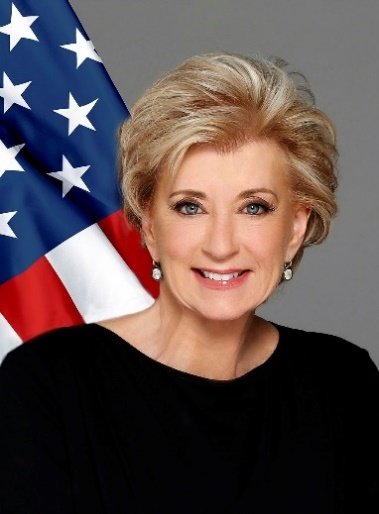
Linda McMahon, Official photo as SBA Administrator
Far from abolishing government control of schools, the Project 2025 plan to disband the ED would only restructure the bureaucracies involved in administering federal education entitlements. In the meantime, Project 2025’s school choice reforms, which include federal “Education Savings Accounts” (ESAs), will likely expand government control over private schools, including religious schools, and home schooling, while also publicly subsidizing ed-tech corporations. At the same time, Project 2025’s school choice tax credits are primed to expand the corporatization of education through public-private partnerships that leverage ed-tech to data-mine how “Pay for Success” (PFS) impact scholarships streamline student outcomes for the social credit economy of the Fourth Industrial Revolution (4IR).
To be sure, as I have documented extensively in a litany of articles and my book, School World Order: The Technocratic Globalization of Corporatized Education, “school choice” is nothing more than a euphemism for an array of public-private partnerships that corporatize government education by funneling tax subsidies into private schools, charter school companies, and ed-tech businesses. Rather than foster curricular freedom independent of federal control, Project 2025’s menu of “school choices” is primed to restrict options to government-regulated private schools, charter edu-companies, and ed-tech corporations, or corporate-managed PFS scholarships, which data-mine students’ learning analytics for social credit commodification in the digital economy of the 4IR. In fact, key architects of Project 2025 are entrenched in the State Policy Network (SPN): an old swamp of neo-conservative and beltway-libertarian think tanks that has long been bankrolled by Koch Brothers philanthropy to push public-private “school choice” corporatization and social impact finance, which are integral to the planned stakeholder economy of the 4IR.
The Dpt. of Education Reorganization Act: Shuffling the Chalkboards on the Titanic
Mandate for Leadership: Project 2025 recommends that the Trump administration dissolve the ED by passing a “Department of Education Reorganization Act.” Trump himself has essentially concurred as he has pledged, “[o]ne other thing I’ll be doing very early in the administration is closing up the Department of Education in Washington D.C., and sending all education and education work and needs back to the states.” Keeping his promise, Trump is preparing to sign an executive order that “would shut down all functions of the department [of ED] that are not written explicitly into statute, or move certain functions to other departments,” according to Newsweek. In the meantime, the Department of Government Efficiency has cut nearly $1 billion worth of ED contracts and grants. Republican Congressmen have also introduced HR 369 and HR 899, which are bills to “[a]bolish” or “eliminat[e]” the ED.
While Trump may align with Project 2025’s plan to sunset the ED, whether he knows it or not, doing so by itself would not return “all education . . . back to the states.” Rather than terminate the government’s control of education, axing the ED by itself would only reshuffle the bureaucracies in charge of schools as the federal entitlements provided under the Elementary and Secondary Education Act (ESEA), the Higher Education Act (HEA), the Individuals with Disabilities Education Act (IDEA), and the Workforce Innovation and Opportunity Act (WIOA) would still remain. Unless the Trump administration were to also pass bills to repeal the ESEA, the HEA, IDEA, and WIOA, the mandates for administering federal education entitlements would merely be shifted to other government departments. In fact, such a reallocation of federal education entitlements through a “reorganization” of government bureaucracies is precisely what is laid out in Project 2025.
According to the Project 2025 Playbook, the proposed “Department of Education Reorganization Act” would transfer the bulk of federal education entitlements to the Department of Health and Human Services (HHS) and the Department of Labor (DOL) while transferring other entitlements to the Department of Justice (DOJ), the Department of Commerce (DOC), and the Department of State (DOS).
For examples:
- The Office of Post-Secondary Education, which administers HEA entitlements, would be transferred to HHS.
- The Office of Special Education and Rehabilitative Services, which administers IDEA entitlements, would be transferred to HHS.
- The Office of Career, Technical, and Adult Education, which administers WIOA entitlements, would be transferred to the DOL.
- The Office for Civil Rights, which enforces Title IX of the ESEA and HEA Amendments of 1972, would be transferred to the DOJ.
- The Institute of Education Sciences, which oversees the Regional Educational Laboratories provided under Title IV of the ESEA, would be transferred to the Census Bureau of the DOC.
- Programs that are “important to national security” would be transferred to the DOS.

In these ways, Project 2025’s “Department of Education Reorganization Act” would actually expand, rather than diminish, government reaches into education as five different federal agencies, rather than a single department, would be permitted authority over school systems. Meanwhile, the ED “employees whose positions are determined to be essential to the mission would move with their constituent programs” to the newly appointed departments, so much of the bureaucratic personnel will remain the same.
At the same time, by yoking education to HHS and the DOL, Project 2025’s restructuring of the ED would basically revert the federal bureaucracy into a system that hearkens back the days of the Department of Health, Education, and Welfare (HEW), which implemented centralized “Planning, Programming, and Budgeting Systems (PPBS)” as the precursor to the ED and HHS. Whereas the 1979 “Department of Education Organization Act” broke up HEW and upgraded its Office of Education into the ED while upgrading its Offices of Health and Welfare into HHS, Project 2025’s “Department of Education Reorganization Act” would merely shift the Offices of the ED back to HHS and other departments, such as the DOL, which administers “Welfare-to-Work” grants. In brief, Project 2025’s disassembling of the ED would bundle together federal health and education bureaucracies under the same department of HHS, like they were bundled together under the same department of HEW, while other departments, such as the DOL, would administer school-to-work along with welfare-to-work programs.
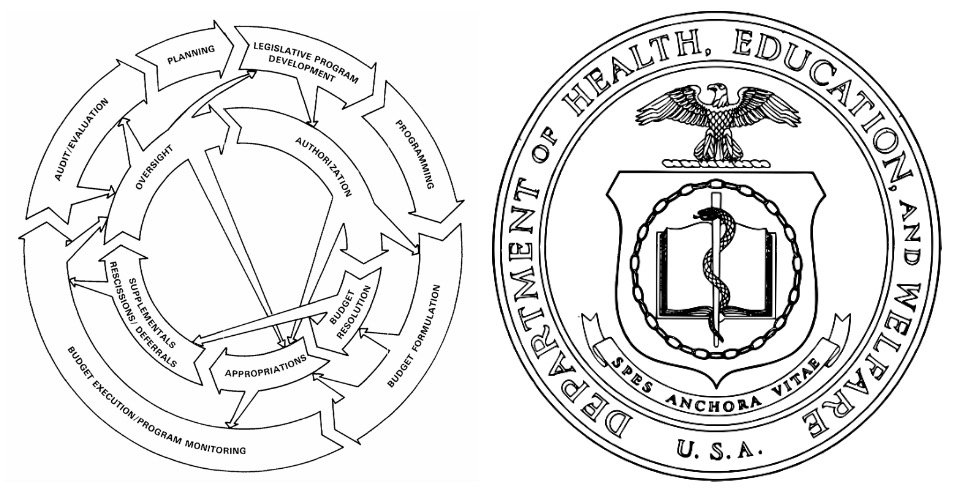
RAND Corporation, PPBS Flowchart – Source |
Official Seal of the US Department of Health, Education, and Welfare
In sum, the Project 2025 plan to dismantle the ED is just another contrivance to refurbish the labyrinth of federal bureaucracies which has always systematically reduced school learning outcomes to an aggregate of mental health and workforce competencies that determine student placement in the “human capital” supply chain of America’s planned economy. By scattering federal education entitlements to HHS and the DOL, data-tracking of students’ mental health and career pathways outcomes would be streamlined by HHS and the DOL respectively, thus magnifying the medicalization and corporatization of government schooling. In this redistributed bureaucracy, HHS and the DOL would also track student health and career outcomes linked with PFS scholarships subsidized by the school choice tax credits proposed in Project 2025.
School Choice, Social Impact Investing, and Government Control of Private, Religious, and Home Schools
There should be no doubt that Trump will greenlight the school choice reforms laid out in Project 2025. From his prior appointment of Betsy DeVos as Secretary of Education, to his current nominations of Linda McMahon and Penny Schwinn for Secretary and Deputy Secretary of Ed respectively, Trump has consistently staffed the ED with champions of school choice. Picking up where his first term left off, President Trump has proclaimed that “universal school choice,” which is advocated in Project 2025, will be a cornerstone of his “Agenda 47” policy platform. Making good on his promise, Trump has signed Executive Order 14191 (“Expanding Educational Freedom and Opportunity for Families”), which directs the Secretaries of Education and Labor to formulate “discretionary grant programs to expand education freedom” while directing the Secretary of HHS to formulate “block grants . . . to expand educational choice . . . , including private and faith-based options.”

Donald and Melania Trump, Agenda 47
Executive Order 14191: “Expanding Educational Freedom and Opportunity for Families”
The universal school choice reforms of Agenda 47 and Project 2025 will crest on the wave of Republican-led school choice bills that were legislated throughout 2023, which was dubbed the “Year of Educational Choice” after twenty states added or expanded school choice subsidies. Three more states joined the trend during the following election year of 2024. Preparing for the federal legislative sessions of 2025, Republican Governors, such as Tennessee Governor Bill Lee and Texas Governor Greg Abbott, paved the way for the passage of universal school choice bills by ousting 2024 Congressional candidates, whether incumbents or challengers, who would not pledge to go along with school choice reforms.
Now, with a Trump victory and a Republican mandate, there is an open lane for the Project 2025 expansion of school choice privatization through the deregulation of charter school corporations; the authorization of ESAs for dispersing ESEA Title I funds; and the subsidization of “Scholarship Granting Organizations” (SGOs) with federal tax credits provided under the “Educational Choice for Children Act” (ECCA). Taking the open lane, Trump has already gotten the Project 2025 ball rolling by convening a National School Choice Week Roundtable where he hosted Republican governors, including Lee and Abbott’s Lieutenant Governor Daniel Patrick, advising them on how they can capitalize on the school choice grants pending from his new EO 14191.

Tennessee Governor Bill Lee (left) and Texas Governor Greg Abbott (right)
While the Project 2025 Playbook calls for “lessen[ing] the federal restrictions on charter schools,” the Playbook places a more ambitious emphasis on instituting ESAs and tax credits that funnel government subsidies not only into charter school companies, but also private schools, including religious schools, and home schools as well. To be sure, while both the ESA and tax-credit proposals of Project 2025 would siphon public tax dollars into private corporations, each entails different implications for expanding either the corporatization of public education or the federal regulation of private, religious, and homeschools. In particular, ESAs could expand the regulatory reaches of the federal government while the tax credits proposed by Project 2025 are primed to streamline “Pay for Success” (PFS) impact investments that turn profits based on whether student health and career outcomes conform to benchmarks standardized by ESG and other social credit indexes.
Concerning the prospects of ESAs, Project 2025 calls for a portion of each student’s ESEA Title I funding to be allocated for “education savings accounts . . . that parents can use to pay for personal tutors, education therapists, books and curricular materials, private school tuition, transportation and more.” Based on these stipulations, such ESA stipends could be used to subsidize not only “private school[s],” but also Big Tech corporations through the purchase of ed-tech products which are integral to the ubiquitous data-mining and omnipresent AI that are imperative in driving the social credit economy of the 4IR. For examples:
- ESA funds for “curricular materials” could be used to buy Skinnerian adaptive-learning courseware, such as Clever and Knewton, which have been financed by Peter Thiel, along with Dreambox and Brightspace LeaP, all of which data-mine students’ cognitive-behavioral psychometrics.
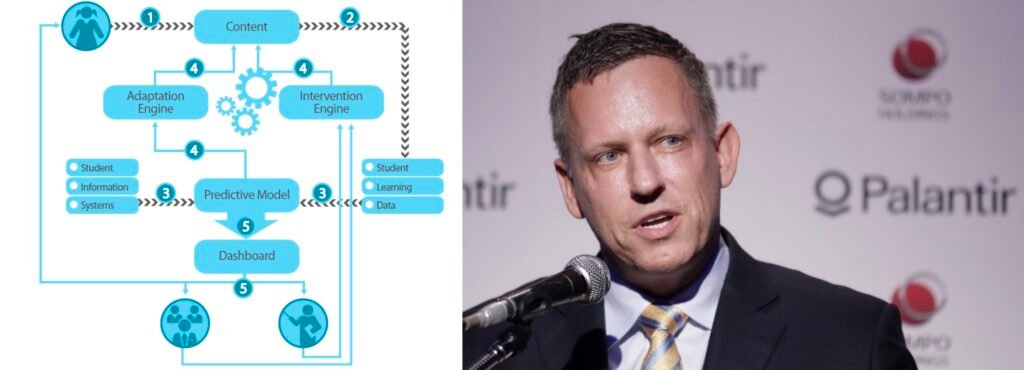
- ESA dollars for “education therapies” could be used to pay for assistive biofeedback wearables, such as HeartMath EKG monitors for managing test anxiety and BrainCo EEG headbands for managing ADHD, both of which data-mine students’ socio-emotional biometrics.

On left: Inner Balance – Source |
On right: Brain Technology, Implantables, and Neuroprosthetics – Source
- ESA money for “personal tutors” could be spent on GPT AI tutors, which data-mine students’ cognitive-behavioral and socio-emotional algorithms.

At the same time, ESA stipends for “private school tuition” could come with strings attached to federal regulations that subordinate private and home schools to government control. Consider the Alabama State “Creating Hope and Opportunity for Our Students’ Education (CHOOSE) Act,” which issues $7,000 ESAs for attending “an accredited private school, including church, parochial, or religious school” along with $2,000 ESAs for costs associated with attending “homeschool.” The CHOOSE Act stipulates that payouts from these ESAs are subject to the following provisions:
- “[P]articipating school[s]” that receive ESA dollars must “[a]gree to comply with all applicable health and safety laws or codes” and “require all participating students receiving program funds to take a standardized assessment.” Furthermore, “participating school[s]” must “[p]rovide the department [of Revenue] with school-level test results for participating students.” Failure to comply “shall constitute grounds for the department, in its discretion, to suspend or disqualify the . . . participating school from receiving program funds.”
- “[P]arent[s],” including “homeschool” parents, who receive ESA funds must “[a]gree to comply with rules adopted by the department for the administration of the program” and “[s]ubmit to the department any information required by the department for implementation of the program.” Failure to comply “shall constitute grounds for the department, in its discretion, to revoke, recover, suspend, or deny the [ESA] credit otherwise made available pursuant to this act.”
To be sure, similar restrictions could be imposed through federal ESAs as Project 2025 indicates that the Alabama CHOOSE Act is one of the ten state ESA laws on which its proposal for federal ESAs is based. As a result, such Title I ESAs would federalize private schooling as much as corporatize public education, simultaneously expanding the reaches of Big Government and maximizing the profits of Big Business.
On the other end of Project 2025’s school choice platform, there is a proposal to pass the “Educational Choice for Children Act (ECCA),” which would award federal tax credits to corporations that donate to “Scholarship Granting Organizations” (SGOs) designated to dole out “scholarships” to students to cover the costs of “qualified elementary or secondary education expense[s].” According to the ECCA, such qualified expenses include “tutoring expenses” and “expenses at private or religious elementary and secondary education institutions.”
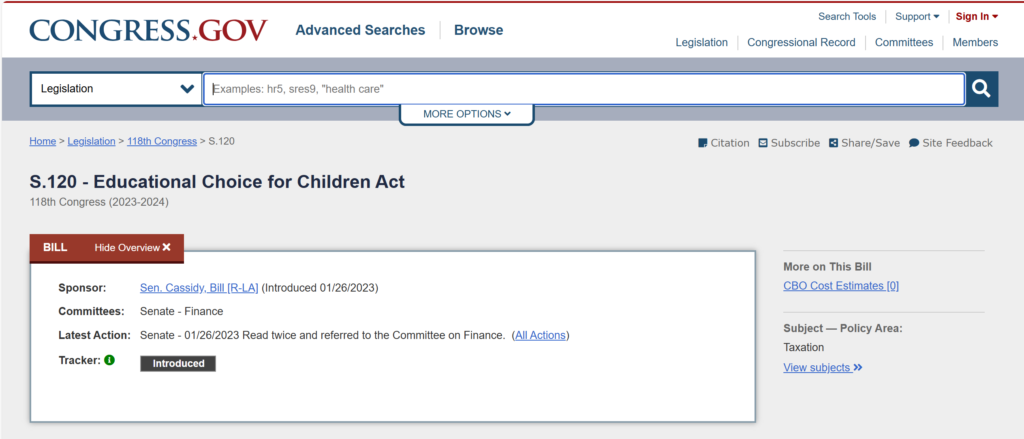
Educational Choice for Children Act – Source
Unlike the CHOOSE Act, the ECCA stipulates that “[n]othing in this Act, or any amendment made by this Act, shall be construed to permit, allow, encourage, or authorize any Federal, State, or local government entity, or officer or employee thereof, to mandate, direct, or control any aspect of any private or religious elementary or secondary education institution.” However, the ECCA also stipulates that “[n]othing in this Act, or any amendment made by this Act, shall be construed to permit, allow, encourage, or authorize any Federal, State, or local government entity, or officer or employee thereof, to mandate, direct, or control any aspect of any scholarship granting organization.” In other words, while the ECCA prevents private and religious schools from being federally regulated as a result of accepting government-subsidized SGO scholarships, it does not prevent SGO corporations from controlling the terms and conditions, including PFS social impact provisions, of the scholarships.
To be sure, “Pay for Success” impact contracts are provided for in the Every Student Succeeds Act (ESSA), which reauthorizes and amends the ESEA. In accordance with ESSA, “Pay for Success” contracts can stipulate that an SGO put corporate money upfront for scholarships and then receive that money back from the government, along with a potential profit, depending on whether student outcomes meet or exceed projected “social impacts” that align with ESG and other social credit metrics. In fact, many SGOs facilitate their scholarships through social impact contracts.
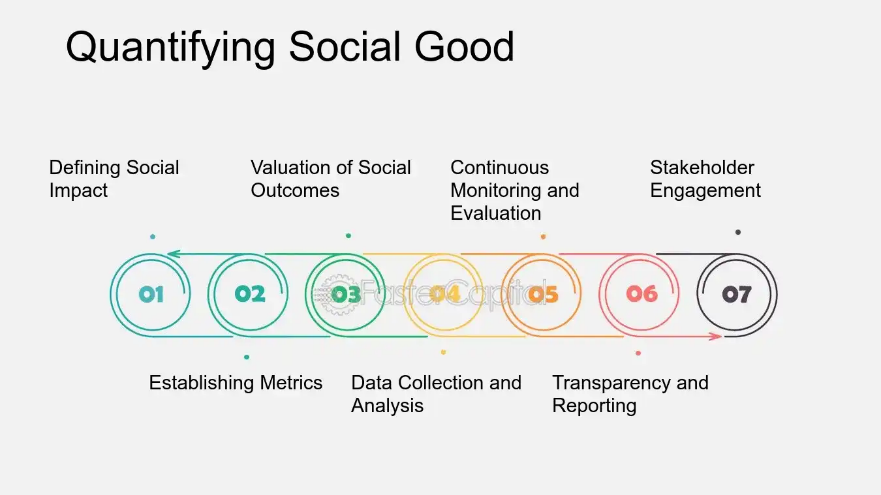
Social Credit Flowchart – Source
Consider the Sagamore Institute, which is “an action-oriented think tank” that facilitates “social impact” investments through “sustainable initiatives,” such as its “Scholarships for Education Choice program.” Registered as a “Certified Participating SGO” under the Indiana State Department of Education’s “School Scholarship Tax Credit Program,” the Sagamore Institute grants “Education Choice” scholarships in “partner[ship] with large and small schools, traditional and classical schools, secular and faith-based schools, and schools that serve special needs populations.” The Sagamore Institute has also pushed “Impact Investing” aimed at “‘Supply Side’ Welfare Reform” that redistributes “Private Capital for [the] Public Good” of remedying socioeconomic disparities across racial demographics.

Similarly, the Point Foundation, which is “the nation’s largest scholarship-granting organization for LGBTQ students,” doles out “impact” scholarships aimed at “mitigat[ing] generations of racism and an education system born from discriminatory policies by providing financial support, community resources, and professional development to LGBTQ students who identify as Black, Indigenous, and People of Color [BIPOC].” Point Foundation scholarships, which are sponsored by World Economic Forum (WEF) partners, such as Amazon and Morgan Stanley, are bankrolled by donations stipulated for “advanc[ing] social justice, diversity, inclusion, and equality” along with “equity.” In other words, the Point Foundation’s impact scholarships are issued to advance social justice outcomes for LGBTQ-BIPOC stakeholders in accordance with the ESG social credit economy championed by the WEF.

If you think that such “DEI” impact scholarships have now been banned due to Trump’s recent executive orders (EOs), think again. EO 14151 (“Ending Radical and Wasteful Government DEI Programs and Preferencing”)and EO 14173 (“Ending Illegal Discrimination and Restoring Merit-Based Opportunity”) only repeal DEI provisions stipulated in prior executive orders, including EO 11246, EO 11478, EO 12898, EO 13583, EO 13672, and EO 13985. Although EO 14190 (“Ending Radical Indoctrination in K-12 Schooling”) expunges “Federal funding sources and streams, including grants or contracts, that directly or indirectly support or subsidize the instruction, advancement, or promotion of gender ideology or discriminatory equity ideology,” it does so only “to the maximum extent consistent with applicable law.” Since none of Trump’s executive orders repeal diversity, equity, inclusion, or PFS provisions codified in the ESSA law, none of his EOs prohibit ESSA PFS contracts that subsidize SGO impact scholarships which target DEI or ESG outcomes; nor do any of his EOs prohibit federal tax credits from subsidizing corporate donations to such SGOs.
To be sure, PFS impact investments are pushed not only by “left-wing” DEI organizations, but also by “right-wing” conservative think tanks, such as the American Enterprise Institute (AEI) where Max Eden, who is a co-author of Project 2025’s “Department of Education” chapter, has served as a Research Fellow, a Senior Fellow, and an Education Policy Program Manager. In fact, in a “Research Paper” drafted for a 2014 AEI Research Conference titled School Choice: Encouraging New and Better Schools, Eden advocates for “social impact bonds” financed by “private school choice venture capital firms.”
Although the AEI does not endorse impact investments that target sociocultural DEI outcomes, the AEI does call for PFS investments that target socioeconomic outcomes, including workforce, health, and safety outcomes. In either equation, SGOs are primed to peddle PFS scholarships designed for advancing social impacts, whether sociocultural impacts or socioeconomic impacts, in order to socially engineer “human capital” markets in which students are commodified to streamline social credit supply chains for the 4IR stakeholder economy.
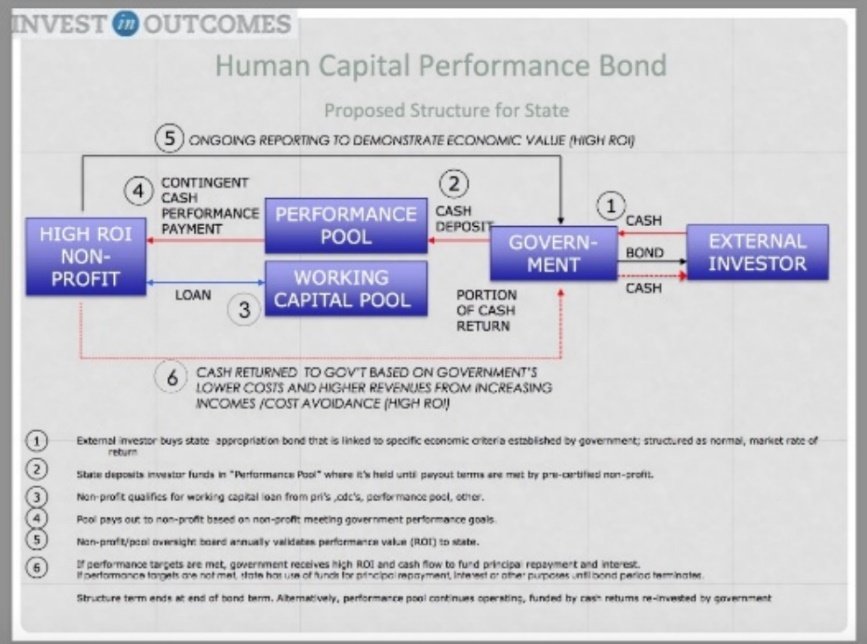
In sum, PFS scholarships fueled by ECCA tax credits will facilitate public-private education partnerships in which corporations steer the funding streams for both public and private schools while federal and state governments subsidize those companies’ investments in social credit and human capital markets. At the same time, Title I ESAs will expand government control over private schools, including religious and home schools, while federally subsidizing corporate ed-tech products geared to digitally track and trace PFS impacts on students’ social credit outcomes. Altogether, Project 2025’s school choice reforms will expand Big Government control of private, religious, and home schools while expanding Big Business management of both public and private education through impact scholarships which advance ESG and other social credit outcomes streamlined by Big Tech corporations that helm the planned stakeholder economy of the 4IR.
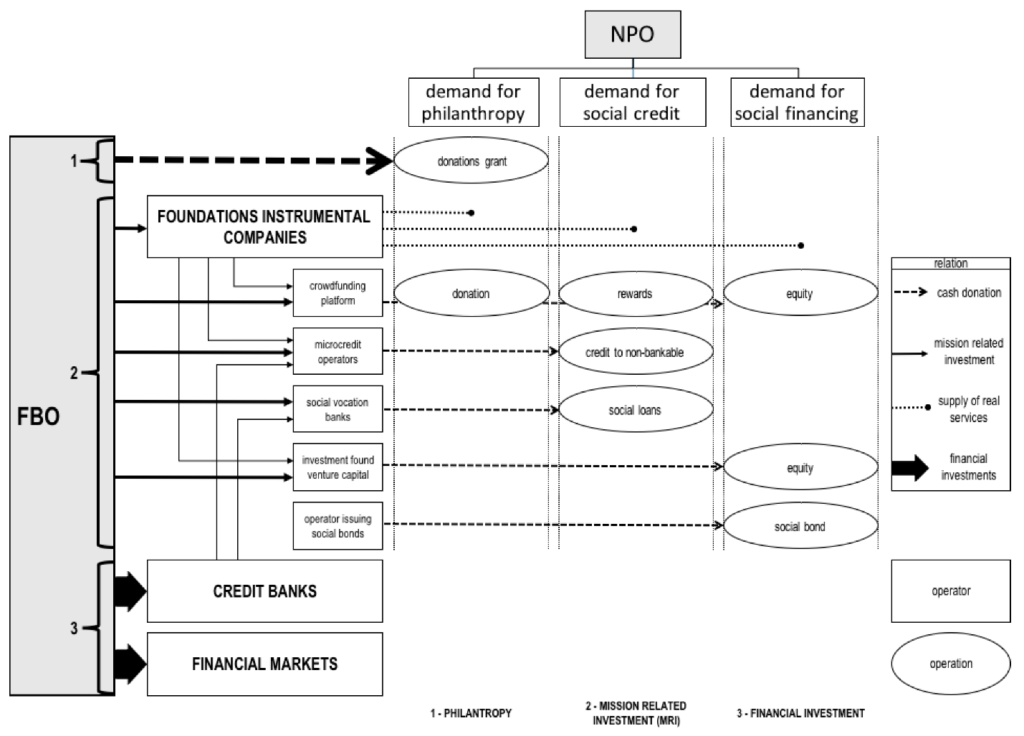
“Foundations of Banking Origin and Social Rating Philosophy—A New Proposal for an Evaluation System,” Sustainability 2019, 11(13), 518 – Source
SPN Doctors: Meet the New School Choice, Same as the Old School Choice
The Project 2025 school choice agenda is nothing more than a revamping of a longtime Koch-SPN (State Policy Network) stratagem to cartelize corporate-government control of education through public-private partnerships that funnel public tax subsidies into ed-tech companies and private schools, including religious schools, home schools, and virtual-online charter schools. For over 30 years, Koch-SPN partners, including the Heritage Foundation, the American Legislative Exchange Council (ALEC), the Cato Institute, the AEI, and EdChoice, have been advocating school choice subsidies for private schools and ed-tech companies that provide the digital infrastructure for data-mining PFS impacts on students’ learning algorithms and social credit analytics. In fact, a survey of the authors and Advisory Board of Project 2025 reveals that the school choice ESAs and tax credits proposed in Mandate for Leadership were put forward by affiliates of these Koch-SPN partners many of which have also been advancing PFS and other impact investment schemes.
The Project 2025 Advisory Board includes the Heritage Foundation and ALEC, the latter of which is a consortium of lawyers, legislators, lobbyists, and other “stakeholders” who draft boilerplate bills that are adopted by lawmakers to advance privatization schemes. For examples:
- ALEC has drafted the “Education Savings Account Act,” which codifies generic provisions for “ESA” subsidies that allocate government payments for “private school[s],” “charter school[s],” and “non-public online learning program[s],” including “[p]ayment for purchase of curriculum [and] any supplemental materials,” such as ed-tech courseware.
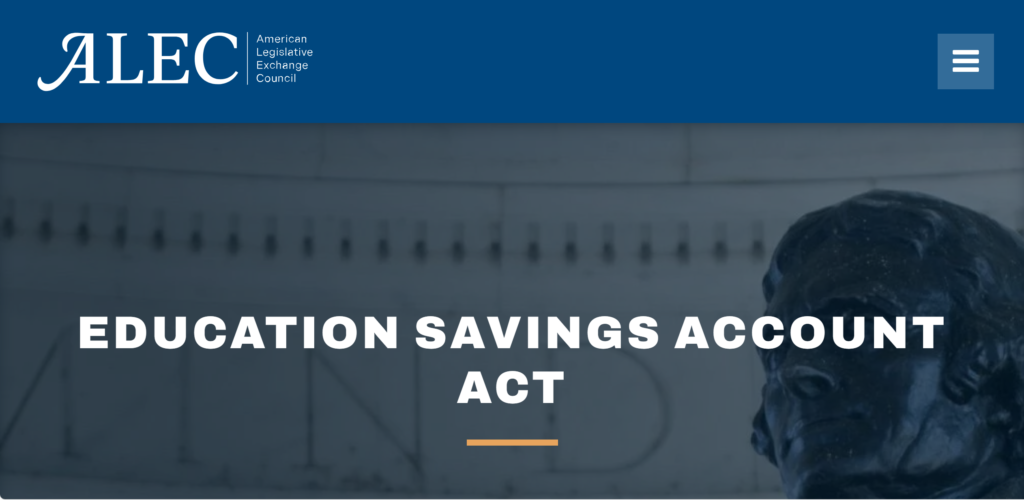
- ALEC has also drafted the “Student-Centered Funding Act,” which offers guidelines for issuing government “voucher[s]” and “tax-credit scholarship[s]” for “private school[s]” and “charter schools” through “a student-centered finance model based on a weighted student formula in which money ‘follows’ a child to his or her school” by “tying funding to performance.”
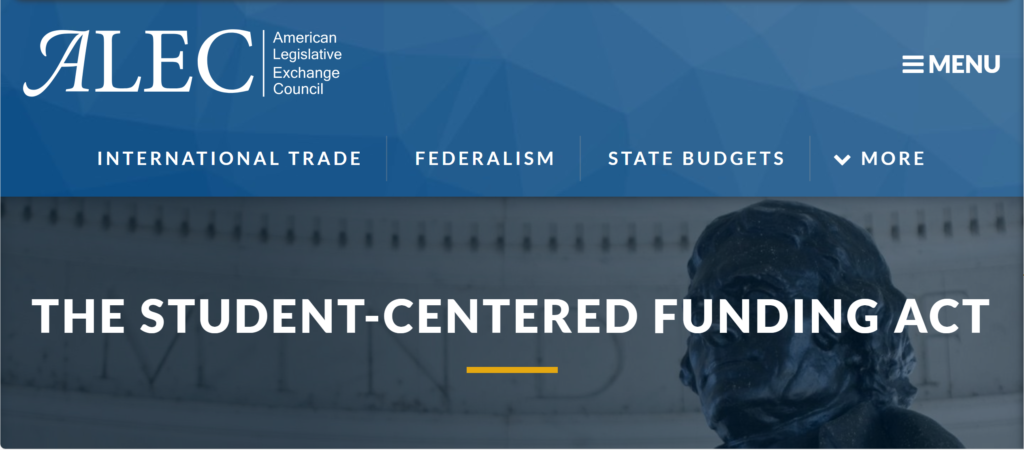
- ALEC has also spearheaded online school choice privatization by propagating the “Virtual Public Schools Act,” which has been used to legalize the public funding of virtual-online charter school corporations in alignment with the “10 Elements of High-Quality Digital Learning” standardized by former Florida Governor Jeb Bush’s Digital Learning Council.

Throughout Trump’s first presidential term, a roster of ALEC associates filled at least 19 of his White House and Cabinet appointments, including his Secretary of Education, Betsy DeVos, who staffed her ED with veterans of Bush’s Foundation for Excellence in Education (ExcelinEd). At ALEC headquarters, DeVos pledged her secretarial commitment to “get the federal government out of the way” so that ALEC could further its progress in legislating corporate school choice reforms, including “ESA,” “voucher,” and “Tax Credit Scholarship” reforms. Prior to her appointment as Secretary of Ed, DeVos bankrolled and/or chaired numerous school choice nonprofits, including EdChoice, the Alliance for School Choice, and the American Federation for Children, which sponsored several ALEC Annual Meetings, including the 2011 Annual Meeting where Bush’s “Elements of High-Quality Digital Learning” were adopted by ALEC’s “Education Task Force.”
Under Secretary DeVos, Robert S. Eitel and Jim Blew, who are both co-authors of Project 2025’s “Department of Education” chapter, served as “Senior Counselor” and “Assistant Secretary of Planning, Evaluation, and Policy Development” respectively. Eitel also served as the “national director” of the Alliance for School Choice where DeVos has served as chair. A longtime financial supporter of the Heritage Foundation, DeVos has announced that “the second Trump term agenda is very, very consistent with what we started. It’s a continuation of the first term.” In fact, DeVos advised that, during his second term, President Trump “needs to . . . get the federal tax credit passed and to de-power the Department of Education” in accordance with Project 2025’s school choice reforms.
DeVos is not the only Secretary of Education to team up with ALEC to push technocratic school choice corporatization. Indeed, ALEC bestowed its Thomas Jefferson Award to Secretary of Education William Bennett, who took over the mantle of Project BEST (Basic Education Skills through Technology), which launched public-private partnerships between government schools and Big Tech corporations that laid the groundwork for ed-tech data-mining in the social credit economy of the 4IR. ALEC’s “Education Task Force” has included representatives from virtual-online charter school corporations, such as K12 Inc., which was set up by Bennett and financed by DeVos.
It is worth noting here that K12 Inc. was also bankrolled by billionaire technocrat Larry Ellison, whom Trump recently tapped to deploy Oracle, a CIA-linked artificial intelligence corporation that collaborates with the WEF, for the Stargate AI infrastructure project. It is also worth noting that Trump’s “shadow president,” Peter Thiel, was a private consultant to Secretary DeVos and a speechwriter for Secretary Bennett.
Like DeVos, Bennett is a longtime ally of not only ALEC, but also the Heritage Foundation, which is the “arch-conservative” think tank that has driven Republican policies, including Project 2025, for more than a half century. In particular, Bennett has served as a Distinguished Fellow in Cultural Policy Studies at the Heritage Foundation where Lindsey M. Burke, who is the main author of Project 2025’s “Department of Education” chapter, is the Director of the Center for Education Policy. One of Burke’s Project 2025 co-authors, Jonathan Butcher, is a Senior Research Fellow at the Heritage Center for Education Policy.

Burke has also served as a “Fellow” at EdChoice, formerly known as the Milton and Rose Friedman Foundation for Educational Choice, which pioneered the push for public-private voucher systems that dole out government stipends for corporate school choice. EdChoice, the Heritage Foundation, ALEC, ExcelinEd, and the AEI are all partners with the State Policy Network (SPN), which is a Koch-backed consortium of think tanks that funnels “dark money” into neo-conservative and beltway-libertarian initiatives aimed at advancing corporatist political-economics.
At the Charles Koch Foundation, another one of Burke’s Project 2025 co-authors, Erin Valdez, has served as a “Program Manager” for “Educational Partnerships.” Yet another of Burke’s co-authors, Andrew Gillen, has served as a “program officer” for the Charles G. Koch Foundation. He is also a “Policy Scholar” at the Koch-founded Cato Institute where he serves as a “research fellow” at Cato’s Center for Educational Freedom. It is worth noting here that the roster of Koch-backed SPN partners includes the America First Policy Institute, where Linda McMahon serves as the “Chair of the Board.”
It is also worth noting here that many of these Koch-SPN cronies have advocated PFS and other impact investment ploys. For examples:
- In a report titled “Pay-for-Outcomes: Transforming Federal Social Programs to Expand Individual Well-Being,” the Heritage Foundation weighed the cost-benefit pros and cons of “pay-for-success” contracts and “[s]ocial impact bonds (SIBs)” in favor of “pay-for-outcomes” financing that “combine[s] the best features of these [PFS and SIB] reforms.”
- In a whitepaper titled “Pursuing Innovation: How Can Educational Choice Transform K12 Education in the US?,” EdChoice called for “new social financial models that have emerged from partnerships between the public, non-profit, and private sectors. These include social impact bonds, innovation funds, and impact investing” along with “pay-for-success (PFS) contracts.”
- At the 2015 ExcelinEd National Summit, a “Strategy Session” discussing “school choice and Pay for Success” innovations was moderated by Chester Finn Jr., who was Bennett’s Assistant Secretary of Education. This Strategy Session convened a panel that included Kevin Chavous, who has served as a president of Bennett’s K12 Inc.; an Executive Team member of Bush’s Digital Learning Council; a board member of DeVos’s American Federation for Children; and an advisor to Barack Obama’s re-election campaign.
- The Charles Koch Foundation has collaborated with Google and Social Finance, which is a premier social impact investment corporation, in partnership with Per Scholas, to advance “diversity, equity, and inclusion” through “Zero Percent Loans” for “career pathways” training that fosters “sustainable tech talent pipeline[s]” for the “tech workforce.”
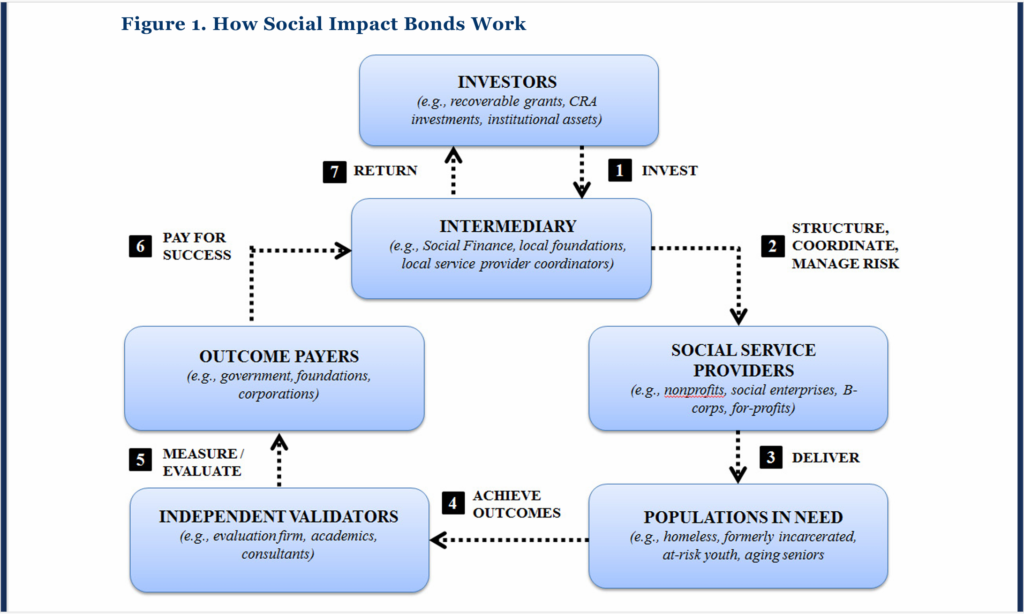
“Investing for ‘Impact’ or Investing for Profit? Social Impact Bonds, Pay for Success, and the Next Wave of Privatization of Social Services and Education,” – Source
In sum, the Koch-SPN network encircling Project 2025 reveals that the Mandate for Leadership’s school choice reforms are nothing more than a renewal of a longtime stratagem to corporatize government education through ESAs and tax credits which subsidize the ed-tech infrastructure needed to data-mine students’ social credit analytics. Indeed, the history of the Koch-SPN syndicate behind Project 2025 illustrates that public-private school choice partnerships have always been geared for streamlining the digital ecosystem necessary to reduce student learning to human capital, which can be monetized and socially engineered through impact finance in the stakeholder economy of the 4IR.
Pick Your Poison
Don’t get swept away in the disruptive whirlwind of Trumpian overhauls or the surrounding hype about how Trump is “winning” and the “Deep State” is “losing.” To be sure, it might seem like dismantling the ED, in conjunction with school choice reforms, will end federal government control of education. Yet the Project 2025 gameplan for dissolving the ED will only restructure bureaucratic control of education while ESAs will likely expand federal control of schools as ESAs conventionally come with government strings attached. At the same time, federal tax credits for SGO scholarships are primed to be leveraged through PFS impact contracts, which come with corporate strings attached to social credit outcomes.
In the final equation, the terms and conditions of Project 2025’s school choice options will not be chosen by students, parents, or even schools, but will instead be chosen by Big Government, Big Business, and Big Tech stakeholders. Even the generic menu of charter schools and ed-tech vendors, which comprise much of the consolation choices afforded to students and parents, were prechosen by Koch-SPN corporatists long before the popularity of Trump or affiliated MAGA branding. Unfortunately, Trump’s planned school choice agenda is nothing more than a rebranding of a very old Koch-SPN blueprint for public-private ed-technocracy in the planned stakeholder economy of the 4IR.






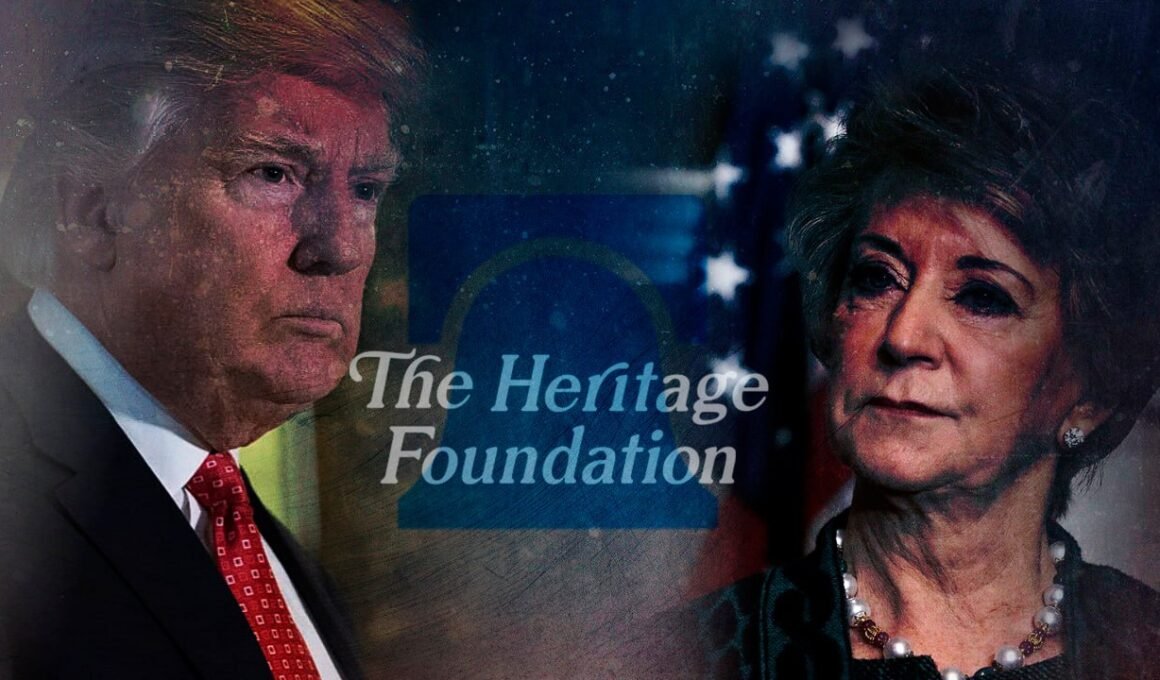
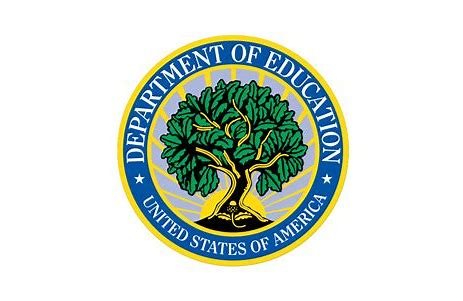










Thank you for this very clear breakdown, the propaganda is done so well to make it sound enticing. I work with youth and they desperately need a new vessel, but one that truly has their personal expanse of mind, body and hearts at the helm.
thank you
Pick your poison, indeed. Thank you.
Your investigation is just incredible, terribly enlightening and without appeal. Thank you.
Thanks John, for such a thorough, detailed X-ray of the Weapon of Mass Instruction (RIP Gatto) planned by the Powers that Should Not Be. Compulsory schooling beginning with Luther always was and will remain the best mind control weapon for our would be rulers. Trump simply wants to continue this illegitimate legacy in his own corporatocractic way. It is amazing to me to see how many tenacles this authoritarian squid has! So many want to be worshiped Rulers and control others rather than themselves. The solution as always is Peaceful Parenting growing Autonomous, Self-Directed Individuals who refuse to be ruled. Get free, stay free—especially of the schooling prisons.
We have to take the good with the bad, and clearly something has to be done with the current dismal failure public education system.
John Klyczek’s article is very enlightening, but 4th Industrial Revolution implications are MOST impactful at the primary education level and “education” largely boils down to “social credit” and discipline. As a Writer and Tae Kwon Do Instructor, Klyczek is far more familiar with both than me.
Here in Akron, OH, property taxes just went up again, by a lot, and again there won’t be any gains made from it, other than for the Teachers and Administrators Average cost per student is $17,000 per year, $3000 more than Ohio’s average., while the schools in my vicinity score 3 out of 10. LeBron James though, he got to go to St Vincent-St Mary’s. All children should have the same opportunity.
Putting a huge emphasis on cost isn’t right, because education of course is an investment which pays for itself over and over again. Kids from around here should have the opportunity to get out of this environment and go to live-in schools elsewhere. The way things are going now, Akron Public Schools may as well start building more prisons, so when they graduate high school, they have a place to stay. Skip a step. Except prison costs $70,000 a year.
Anyhow, getting caught up in the minutiae about the fascist Corporate/State relationships and Peter Thiel collecting everybody’s data is the Libtard argument, because (1) Minors don’t have Constitutional Rights. Parent/Child and Teacher/Student relationships are Control Based , and (2) That’s what 4IR is all about is automation and data collection and analysis.
Here in Akron, OH, which is about half Black
These are not the only two choices. We could put K-12 education back where it belongs which is under the control of the states.
Great work as usual, John.
Tremendous work done here! I have thought for a long time that the D.O.E should be done away with. My wife was a teacher for 42 years in Ct. and she is of the same opinion but this is not the solution . Of course the solution that would be in the best interest of the children and an outcome that balances real learning ,not mind control and propaganda, and social activities that children crave in a balanced way will never be achieved due to greed , corruption and the agenda that the department was formed for from the start. In my opinion the best solution would be the simplest, let parents teach their children what they think is important the way they think is proper . I have spent many decades now unlearning most of what I was taught and re educating myself on subjects important to me. The rest I simply had just forgotten. Like in everything else the government is never the solution but it is always the problem. Thanks again for all you have put out here!
Classic ‘written as if these are bad things’ article.
I’m all for it, and … “Don’t get swept away in the disruptive whirlwind of Trumpian overhauls or the surrounding hype about how Trump is “winning” and the “Deep State” is “losing.”
The Deep State is NOT Trump. You forget that. He May end up controlled by it, he may not be. That is NOT his intention, as he is NOT part of it.
All I see is change, and the destruction of corrupt, useless, bureaucracies. That’s a start.